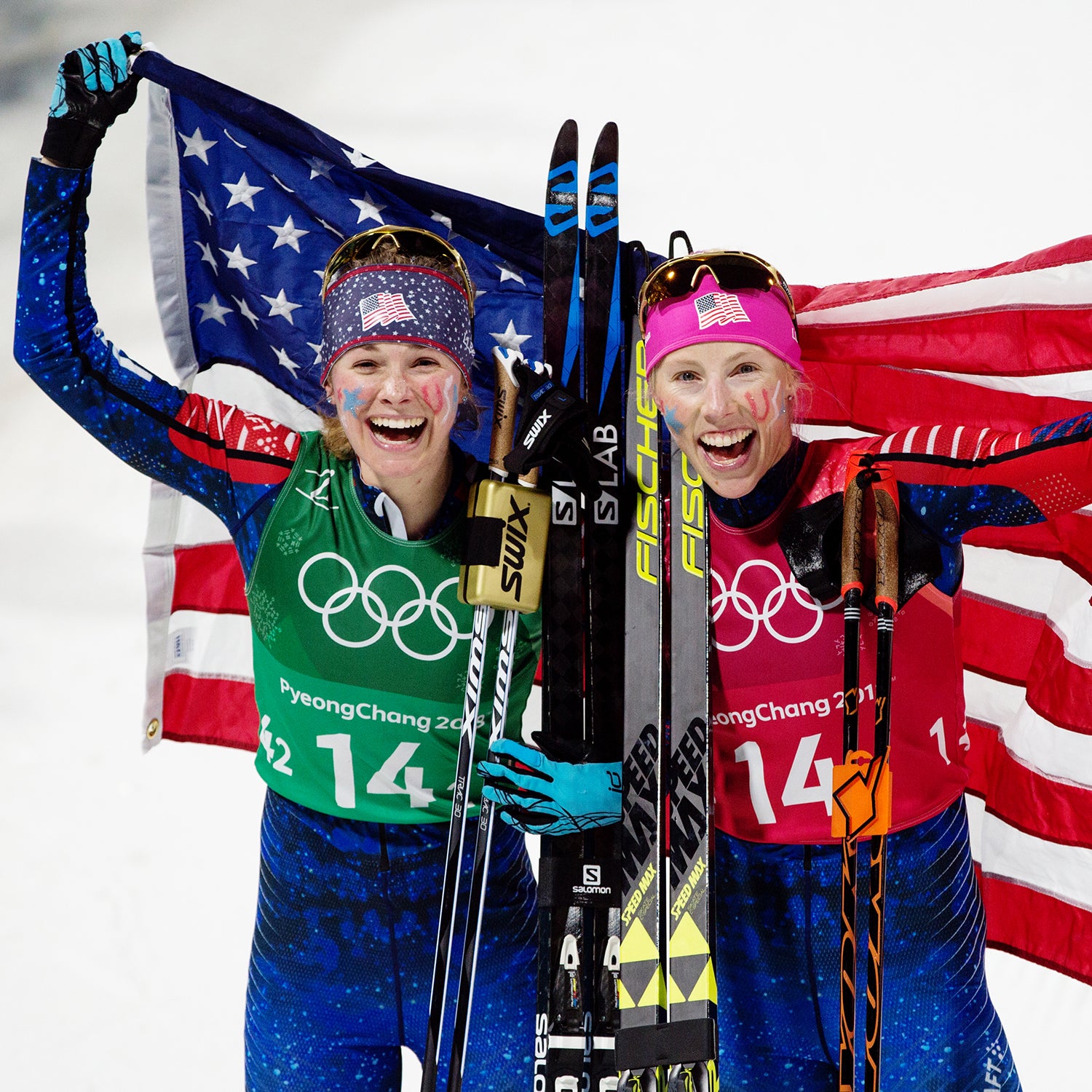Early this morning, in the women’s skate team sprint, Team USA’s Jessie Diggins under the lights of Pyeongchang’s Alpensia Cross-Country stadium. Collapsed in the snow, she reached out to her sprint partner, Kikkan Randall, and audibly cried, “Did we just win the Olympics?”
As we know by now, they had. After six rounds through the 1.25 kilometer sprint course, the duo crossed the line just under two tenths of a second before the Swedish team, and nearly three seconds before the Norwegians. The finish marked the U.S.’s first gold medal in cross-country skiing, and the first-ever Olympic medal for the U.S. women’s team. To many fans and participants of the sport, it was a long time coming. After years of fighting through low funding and setting big goals without precedence, the U.S. women proved today that they’re pure grit covered in spandex.
But today’s result is much bigger than a medal.
To put it simply, these two women are a dream team. The 35-year-old Randall is a pioneer. She was the first U.S. woman to win a World Cup, and to take home a World Cup globe, and to gain top 10 international results. She bootstrapped her way through the sport in a way that paved the road for athletes like 26-year-old Diggins to follow. In her 16 years on the U.S. Ski and Snowboard team (her first Olympics were as a 19-year-old in 2002), Randall has redefined what it means to be a U.S. cross country skier. She was the first to prove that the U.S. could compete against Scandinavian countries without government funding, and without a precedent for success. She took one season away from the World Cup to have her son, and returned stronger than ever. And she did it all with pink hair and glitter, as she could along the way.
Then there’s Diggins. She represents everything the U.S. ski culture needs: optimism, energy, and an undying ability to outwork everyone around her. Like Randall, Diggins boasts her own collection of accolades and firsts, including historic finishes in both these and the 2014 Games. She was the first U.S. woman to win distance World Championship and World Cup events, and perhaps more importantly, the first person to successfully choreograph a featuring Nordic skiers. She and Randall also share the first U.S. World Championship gold medal, from the five years ago. In that race, Diggins lost her pole, but continued hammering at a higher tempo to make up for it, putting Randall into medal contention. That same determination showed this morning. After she came from behind and stretched to the line, Eurosport commentators exclaimed: “This is the race to show your kids and grandkids to inspire them to push and try and give 100 percent.”
People often call cross-country skiing an individual sport. But more than anything, Randall’s and Diggins’ success is a counterpoint to that idea; their victory is a testament to the people rallying behind them. For the past five years, the cross-country ski community—including these women’s teammates, coaches, and hundreds of thousands of fans—maintained the belief that they could accomplish something that had never been done before. Several of the women standing beside Diggins and Randall had equal shots at medals this year, including multi-time World Cup medalists and . This community pushed through dips in funding, apathy in American ski culture, and the general challenges that come with pursuing the hardest sport on the planet. Today, Randall and Diggins proved that this is truly a team sport.
“To have it happen in a team event means so much more to me than an individual medal ever would,” Diggins in her post-race interview. Will we see medals for these women in the individual events? I have no doubt about it. But this win feels very fitting as the first.
Now, the paradigm has shifted. Olympic gold is no longer just a dream that the U.S. ski community dared to pursue. These women did the daring for us. This win is significant because it belongs to so many different people. And it’s just the beginning.


